Flight of the Sparrow
Yusra Amounah's Graceful Resilience amidst Adversity
I couldn’t help but draw a connection between the courageous young girl in The Red Suitcase and our guest this month, Yusra Amounah whose life and work are a testament to the resilience of the human spirit. She is a mother, a teacher on the path to reconciliation, and a deeper understanding of what it means to bring people together. Just like Ariane, years ago, Yusra arrived at the same airport as a Syrian refugee with her two children. Today, she is the inspiring founder of Douri (the Arabic word for sparrow, symbolizing resilience and adaptability)—an organization dedicated to fostering connections among artists, researchers, social workers, and activists within the rich and diverse fabric of European society. After speaking with her, one’s mind expands with a ton of hope and curiosity about what may be possible if we tap into our kindness, detach from ego and outcomes, and give in to our longing to belong. She’s a douri.
I wonder where you would start when reflecting on the origins of your life — your roots and the experiences that have shaped your life today?
I was born in Syria, to a strict Islamic family. I value that upbringing. My mother was determined for me to continue my education, even after I got married. She would take care of my children so I could study. Someone would take me to school and bring me back. My school was exclusively for girls. I had no knowledge of the outside world. Everything was controlled by men. I couldn’t go shopping or leave the house without a male escort. My marriage was arranged by my family; my husband was a relative, but we had no contact before marriage.
I got engaged when I was 14 to my cousin, who was ten years older than me. It was a way to keep the family's wealth within the family. I had no understanding of emotions, marriage, or how to treat or be treated by men. It was all shocking. I didn't know what marriage or sex was. It felt like harassment and was terrifying. To get a man’s kindness you have to do the things they’re asking you to do. I tried to please my husband to avoid his anger, and I was internally building resentment, my anger.
I often imagined myself walking in the streets without a hijab. I tried to resist, telling my father I didn’t want it. My father wasn’t a bad man but adhered to traditional rules. I found a way to say, "I respect your point of view and the circumstances that brought it, but you have to accept me." In our community, if a man here stands up and defends women’s rights, the community can kill them. This was my life before Lebanon, before the war.
How did you escape?
I felt unsafe, so I decided to take my children and leave. We escaped quietly, like the woman in the movie “Red Suitcase,” holding our breath to avoid detection. It felt like divine intervention helped us.
Did you have any support along the way?
No one would give you a hand, you must be very strong. When we talk about feminist values here, we have to be careful and considerate of the fact that any misstep could cost you your life or your child’s. At that moment, you don't see yourself as a victim because you've been taught to believe this is the right way. I was trying to gain my husband's kindness, avoid his violence, and that is the right way. The idea of a victim there is completely different from the Western perspective.
When I gained my freedom and fled to Lebanon, I cut all communication with my family for two years. Eventually, I reconnected because we all need our families. I am lucky my family accepted my choices.
Could you share the story of how you came to be in Luxembourg?
The biggest issue was my children's education in Lebanon. They faced discrimination and violence in school. I learned English and received help from an Italian association to move to Italy. When I arrived there, I felt completely lost and overwhelmed. With my two children, not knowing the language, I didn’t know where to start. The woman assigned to help me warned me that I might have to do things I wouldn’t like, which frightened me. I considered going to France where my brother lived, but he couldn’t support me.
In those challenging days, I found solace in a Catholic association that offered us shelter for ten days. Then, a woman I knew from Lebanon advised me to go to Luxembourg, assuring me that the authorities there would provide the help I needed.
That's how I came to Luxembourg and began a new chapter in our lives. I faced further challenges, including an obligatory marriage to register my child. I am grateful for every step of this journey and the incredible resilience it has built in us. Today, I am finally able to make my own decisions.
What potential blind spots do you see in Western feminism when it comes to understanding and advocating for women's rights in the Middle East?
Western feminism often tries to teach. They don’t know that they have to learn. They don't understand the mindset of women who are controlled. Even if my father did not make the right choices, I could understand him. In my culture, women can be more controlling and judgmental towards each other.
Let me tell you a story. I was eleven. I had this red bicycle that I really loved. I would spend the whole day cycling around. My father had a big shop so I would cycle nearby, go there to take some sweets, and then go back to cycling. One day, when I arrived at the shop, he slapped me, and told me “You will never ride your bicycle in the streets again, go home.” Why? A woman asked my father if he’d agree to marry me to her son. I was just a child. So, for me, the villain was this woman. In our communities, women are often the enforcers of control, not the men. My mother still can't accept my lifestyle, even though she's now independent in Europe.
In Europe, the major goals of the feminist movements have been processed very well. However, Western feminism must recognize that the struggles for women's rights vary significantly across different cultural and social contexts. It is crucial to remember historical contexts; in some regions, fighting for rights can be a matter of life and death. Even within Europe, feminism's development varies across countries, with women in less developed regions facing substantial challenges. Western feminism must draw lessons from these diverse experiences.
We often focus on what politicians can do to create inclusive societies. I want to emphasize the role of each individual in this process. How can we contribute to building communities where people from diverse backgrounds, including minorities and refugees, feel a sense of belonging, and are seen, understood, and safe?
For me, when thinking about a woman arriving in a vulnerable situation, there is a story that stands out. Here in Luxembourg, I know a refugee woman from Iran. When I asked her about the difference in her rights between Iran and Luxembourg, she surprisingly said she had more rights in Iran. I was shocked and asked why. She explained that in Iran, she knows the system and can read and access information. Here in Luxembourg, she feels she has no rights because she doesn't know anything.
As a woman living in Europe, if you approached me wanting to help and support refugees, I'd suggest starting with small, manageable actions. Even changing one thing in one woman's life is significant. For example, in Luxembourg, a local woman helped refugee women by showing them where to buy groceries and teaching them how to drive. These small gestures make a big difference. Communication is key, even without a common language. It's about connecting and offering practical support. Volunteering just a couple of hours a week can make a difference.
It's crucial to help genuinely, not out of pity. Don't try to prove yourself on the shoulders of refugees. We don't need sympathy; we need support. When I arrived and told my story, I saw empathy in people's eyes. I don’t need empathy; I need you to support my strength and believe in me. When our paths cross, I need support coming from a stance of equality. It won't be balanced if every time I contact you, I feel that I am weaker. I am not a victim. I'm living my life and making my choices. I am capable of doing something; just give me an opportunity. Often, the problem is that we don't get those opportunities.
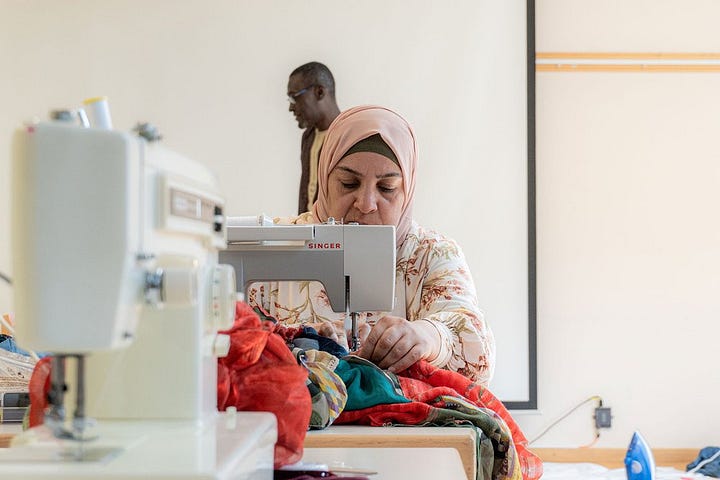
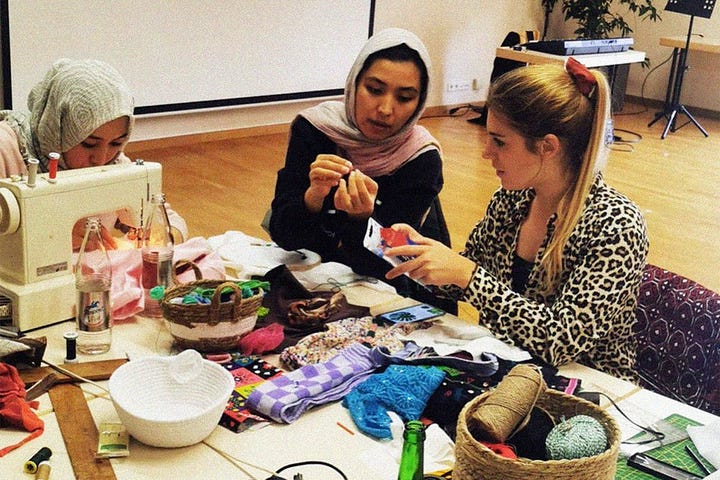
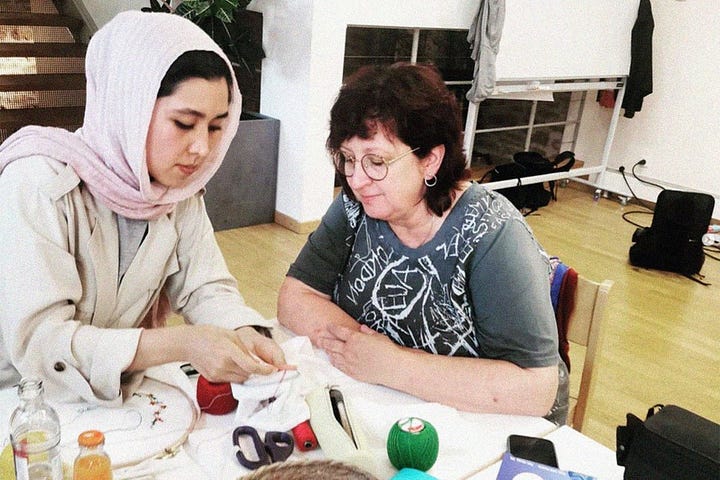
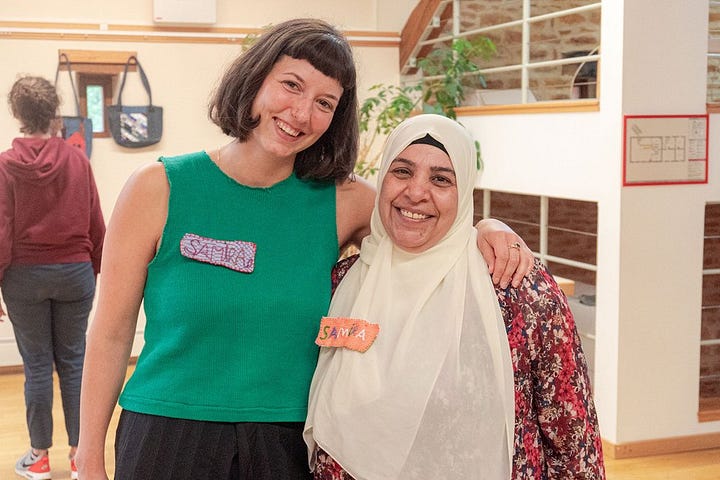
What inspired the creation of Douri? Tell us more about its mission.
The idea for Douri is rooted in my passion for acting. When I was a child, I would spend time alone in my room, imagining situations and acting them out. I was creating my own world. Eventually, I had the opportunity to take theater courses. It was incredibly special to me. I loved it. If I had been born into different circumstances, I might have become an actress.
When we arrive in a new place with all our traumas, we need a space away from our responsibilities to integrate and rebuild our lives. Art provides this space. Acting, in particular, helps us express ourselves in a safe environment. It allows us to give shape to the things inside us, even if others don't fully understand.
When I arrived in Luxembourg, I wanted to connect with the community. I began with online activities during the pandemic, focusing on storytelling and artistic expression. I approached the local commune for office space, despite language barriers. They saw my determination and provided an office, which was a significant step. We launched various projects, like teaching Arabic through singing. These activities brought people together, fostering friendships and support networks. Douri is about building connections and helping people integrate by sharing their cultures and experiences.
In Luxembourg, there are many distinct communities—Portuguese, Italian, Ukrainian, and others. When I look at Luxembourg, I see fragmentation. It's a mosaic, but the pieces are not connected. We need to bring these communities together and create links between them. I always say that Douri is an association for the entire society. We do not focus on one nationality or religion; we work for everyone.
Douri means "sparrow," and sparrows live in communities worldwide, sharing the same voice and color. This is why I chose the name; it symbolizes unity and community. Can we, like sparrows, live together harmoniously?
Douri focuses on art and creating safe spaces, while other associations provide legal and psychological support. Our goal is to help people express themselves and integrate into the community. Art offers an outlet for emotions and helps people connect without the pressures of survival. It also helps people discover things about themselves. We encourage children to express their fears and experiences through stories and drawings. This process is a journey of self-discovery and healing.
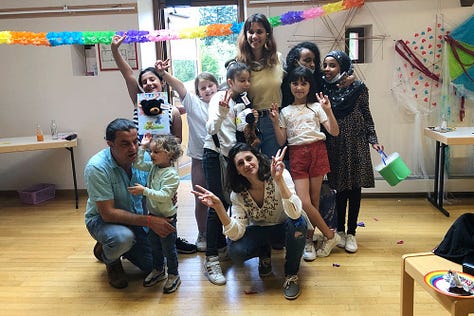




Can you tell us about some of the projects?
We started the Storytelling initiative online with participants from Turkey, Syria, Luxembourg, Germany, and other places, involving both adults and children. Seeing yourself through your child's perspective is completely different and eye-opening. As different artists joined our journey, the initiative developed further and is now flourishing. It focuses on creating environments where children can freely express themselves through drawing and storytelling. They create their own stories and books, and when you compare their work to conventional children's books, you realize how unique their perspectives are. We often don't truly understand them.
Additionally, I collaborated with someone experienced in teaching the Koran to teach Arabic to non-Arabic speakers, including teenagers and some adults. The project was a success; one girl who had never spoken Arabic started singing in Arabic. The teenagers even formed a WhatsApp group and continued communicating as friends. This experience showed me the importance of creating environments where people can come together to learn and connect.
We also organized "Parlez Facile," volunteer-led language practice sessions for French and Luxembourgish. Unlike traditional, boring language classes, these sessions allowed people to enjoy their evenings while learning. This approach emphasized the importance of building communication and community.


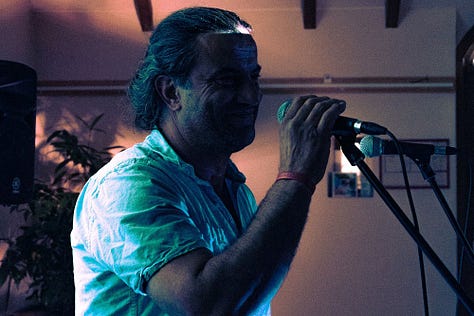


Cover illustration: Alice Walczer


